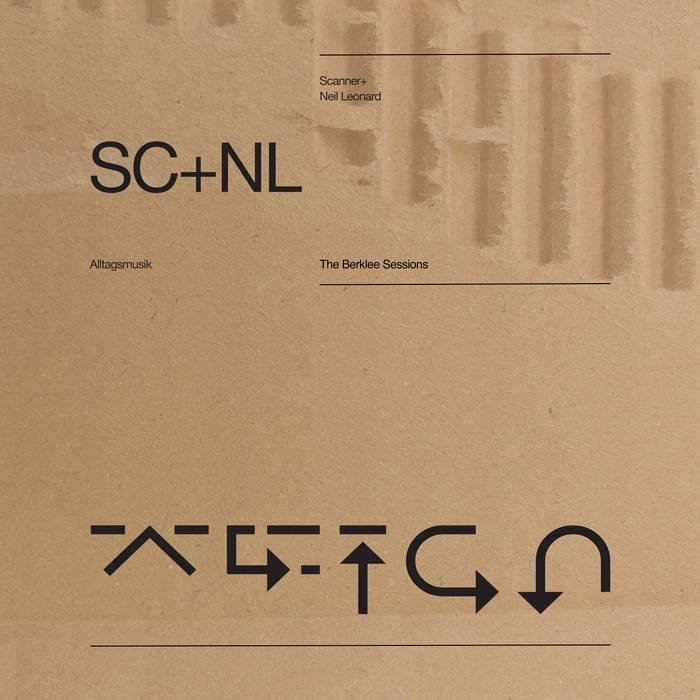One of the most striking things about Robin Rimbaud aka Scanner’s three decades long career is just how varied yet consistently solid the British electronic musician and producer’s output has been. The emerging drama of shortwave radio samples and plunderphonics of his earlier releases (Scanner, Scanner ², Mass Observation) somehow laid down a thread to the pumping bass and lush textures of braindance on his later works (Electronic Garden, Trawl), with abstract sound art, spectral ambient explorations, and abrasive concrète sprinkled in between for good measure. His latest record, The Berklee Sessions, sees him tapping into the jazzy, slightly melancholy but mostly joyful sounding electronica that dominated the airwaves for parts of the 2000s and 2010s, now presented with a sumptuous, live music twist.
Joined by Boston-based composer and saxophonist Neil Leonard, guitarist David Tronzo, bassist Mike Rivard, and drummer Dean Johnston, Rimbaud transposes the jazz fusion aesthetics inherent to IDM into a looser and decidedly more organic group setting. While the foundations are familiar – the syncopated rhythmic patterns, the sense of sustained tension woven into slowly evolving textures – the pieces grow in shifting directions, guided by the implicit rules of collective improvisation.
Case in point, the opening ‘Time Coded’ moves out on the back of a skittering rhythm composed of precise synthetic clicks and brusque cymbal hits, then builds up by breaking down. It locks into a swirling dance, with guitar licks, muted saxophone vamps, and an assortment of electronic curls circling around the throbbing central bass groove. It’s a pretty and soulful cut that maintains interest thanks to its mutating material, stimulated both by furtive saxophone solos and the sort of gradual, almost imperceptible crescendo that we usually associate with The Necks. Sonic transmissions and voice snippets trawled from radio waves provide a segue into ‘Aerospace Millions’, an undulating, motorik piece that bridges jazz and space rock’s sensation of cosmic vastness with the relentless forward drive of krautrock.
On Rimbaud’s previous encounter with jazz proper, 2010’s Blink Of An Eye, he manipulated and intervened on recordings provided to him by Matthew Shipp’s Post Modern Jazz Quartet (featuring Michael Bisio, Michael Thompson, Khan Jamal), reshaping the ensemble’s live sessions into a subtle electronic phantasmagoria – an approach in part also employed by Hprizm, Gerald Cleaver, and Brandon Lopez on their 2023 record In The Wilderness. Meanwhile, although The Berklee Sessions was recorded ten years ago, the captured live material appears largely intact, with minimal post-production interventions and Rimbaud functioning as an equal member of the group.
This is perhaps most easily evident on the gorgeous and heartwarming ‘Kerosene Bliss’ on which his electronic effects shuffle through various dreamy modes with a faint sense of uncertainty, while a tambourine’s accelerating shake starts resembling a club-ready hi-hat beat. Elsewhere, ‘Everything over the Sun’ descends into a dense, dusky ambient whose surface is still like a pond’s while shadowy things percolate beneath it and ‘Muster Assemblage’ fuses Bitches Brew-era Miles Davis and 1970s progressive rock.
Before ‘Six Cover Notes’ drops curtain by radiating beatific balladry, the almost twenty-minute long ‘Nothing Under The Sun’ dives deep into nu jazz and downtempo, bringing to mind Nils Petter Molvær and Eivind Aarset with its propulsive, bass laden rhythm and snaking saxophone phrases that seem to have no beginning nor end. It sounds and feels like a nocturnal dérive experienced on the breezy streets of a desolate city. Circling back to the disparate nature of Rimbaud’s discography, The Berklee Sessions will only make it more difficult to pigeonhole him as an artist. To borrow words from a memeified cliché, he contains multitudes, each of them compelling.


